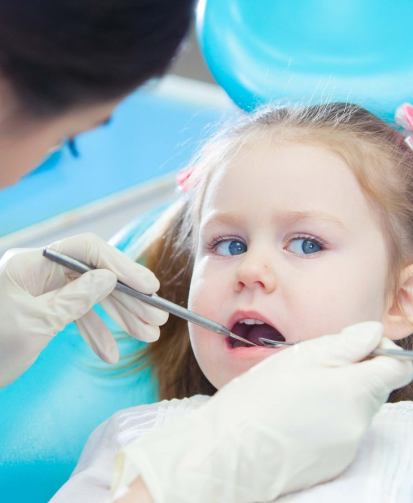Preventative Dentistry
When kids get introduced to their dentist at an early age, they begin a lifetime of healthy dental practices that are often
difficult for parents alone to enforce. It all begins with good preventative dentistry. The experienced pediatric dental
team at Tiny Smiles Pediatric Dentistry know how to talk to kids about good oral practices. With offices in Woodbridge,
New Jersey, Harlem, NY and the Lower East Side of Manhattan, they reinforce your home teachings and, with regular
checkups, ensure no problems interfere with your kids’ healthy dental development.

Why Is Early Preventative
Dentistry Important?
In addition to the important education your kids get when they visit a dentist early, the pediatric dentist detects tooth decay early, preventing worse dental problems and more invasive procedures. To make sure that your kids’ first introduction to their dentist goes smoothly, find an experienced pediatric dental team with a reputation for working well with youngsters.
The staff and dentists at Tiny Smiles Pediatric Dentistry — in Woodbridge, New Jersey, the Lower East Side and Harlem, NY — bring a wealth of experience to the task.They make kids feel comfortable and safe in their chairs. Your kids learn to trust their dentist and may even look forward to the next visit.
- Sealants
- Fluoride treatments
- Teeth cleaning
Nearly 40 percent of kids show signs of tooth decay by the time they start kindergarten — a statistic that changes dramatically with early intervention and preventative dental care for your family. Contact the best pediatric dentists in NYC and NJ at Tiny Smiles Pediatric Dentistry today for your child’s first appointment.

Why Do Children Grind
Their Teeth?
Adults may grind or clench their teeth for stress-related reasons. When teens grind teeth, it may also be related to anxiety, caused by stressors such as overloaded schedules, problems with peers and academic challenges. Other rea-sons for teens and kids grinding teeth include:
- An abnormal bite, such as overbite or underbite
- Missing or crooked teeth
- Irregularly shaped teeth
- Crowded teeth
- Breathing problems from allergies or a stuffy nose
Sleep bruxism sometimes runs in families and may be related to genetics. Bru-xism is also related to some health conditions that affect children, such as att-ention deficit hyperactivity disorder, gastroesophageal reflux disorder, sleep apnea and night terrors.


